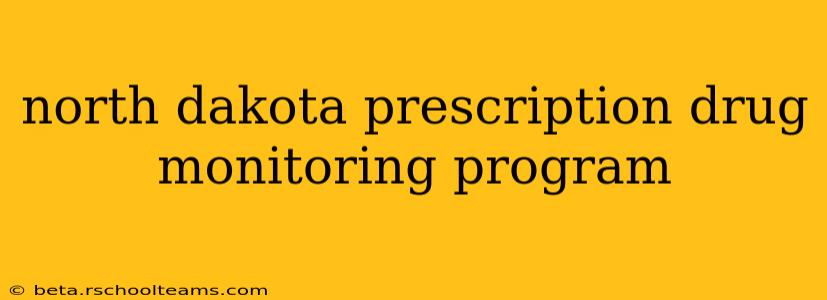North Dakota's Prescription Drug Monitoring Program (ND PDMP), also known as the North Dakota Controlled Substances Reporting System (ND CRS), is a crucial tool in the fight against opioid addiction and prescription drug abuse. It's a confidential database that tracks controlled substance prescriptions dispensed within the state. This information helps healthcare providers, pharmacists, and law enforcement make informed decisions about prescribing and dispensing controlled substances, ultimately aiming to improve patient safety and reduce the misuse of prescription drugs.
What is the North Dakota Prescription Drug Monitoring Program?
The ND PDMP is a centralized electronic database that collects information on prescriptions for controlled substances dispensed in North Dakota. This data includes the patient's name, date of birth, address, and prescription details, such as the drug name, dosage, quantity, prescriber, and dispensing pharmacy. The primary goal is to provide healthcare professionals with a comprehensive view of a patient's controlled substance prescriptions, enabling them to identify potential red flags indicating misuse or diversion. This helps prevent overprescribing, detects "doctor shopping" (patients obtaining prescriptions from multiple doctors), and assists in identifying patients who might benefit from addiction treatment.
How does the ND PDMP help combat opioid abuse?
The ND PDMP plays a significant role in curbing opioid abuse by:
- Identifying potential prescription drug misuse: By providing a comprehensive view of a patient's prescription history, healthcare providers can quickly spot patterns of potentially harmful behavior. This may involve frequent prescriptions from multiple providers, unusually high doses, or rapid refills.
- Preventing overprescribing: Healthcare professionals can use the database to avoid prescribing additional controlled substances to patients already receiving significant quantities, reducing the risk of overdose and addiction.
- Supporting informed prescribing decisions: The data helps healthcare providers make better-informed decisions about pain management and treatment plans, balancing the need for pain relief with the risks of addiction.
- Facilitating early intervention: The ND PDMP can help identify patients at risk of addiction, allowing for early intervention and referral to treatment programs.
Who can access the North Dakota PDMP?
Access to the ND PDMP is carefully controlled to maintain patient confidentiality and prevent misuse. Authorized users include:
- Licensed healthcare practitioners: Physicians, dentists, podiatrists, nurse practitioners, physician assistants, and other licensed healthcare providers who prescribe controlled substances.
- Pharmacists: Pharmacists who dispense controlled substances.
- Law enforcement officers: Under specific circumstances and with appropriate legal authorization.
Access is granted only after undergoing proper training and registration. The system features robust security measures to protect patient privacy.
How do I access the North Dakota PDMP?
To access the ND PDMP, healthcare professionals and pharmacists must register and complete the required training. Information on registration and training is typically available through the North Dakota Board of Pharmacy or a similar state agency. It's crucial to note that specific procedures and requirements might change, so it's recommended to check the official website for the most current information.
Is the ND PDMP confidential?
Yes, the ND PDMP is designed to maintain the confidentiality of patient information. Strict regulations govern access and use of the data, ensuring patient privacy is protected while allowing authorized users to access the necessary information to fulfill their duties. Unauthorized access or disclosure of information is a serious offense.
What are the benefits of using the ND PDMP?
The benefits of using the ND PDMP extend beyond simply combating opioid misuse. They also include:
- Improved patient safety: Reduced risk of overdoses and adverse drug events.
- Enhanced healthcare quality: Better-informed prescribing practices lead to more effective pain management and treatment.
- Strengthened public health: Reduced prescription drug abuse contributes to a healthier community.
- Cost savings: Preventing misuse can reduce healthcare costs associated with addiction treatment and emergency room visits.
This information is for general knowledge and informational purposes only, and does not constitute medical advice. Always consult with a qualified healthcare professional for any health concerns or before making any decisions related to your health or treatment. For the most up-to-date information on the ND PDMP, please refer to the official North Dakota Board of Pharmacy website.
